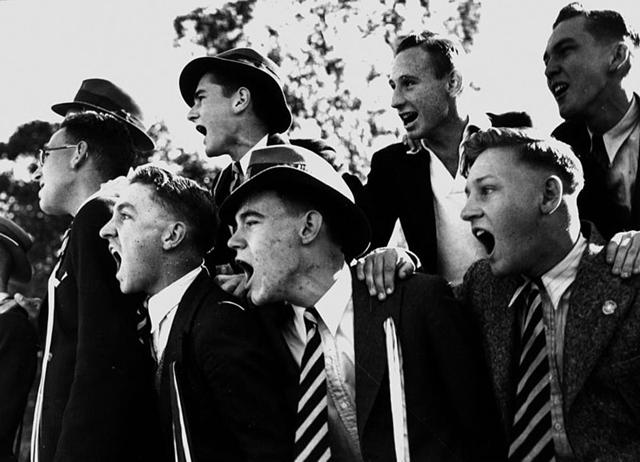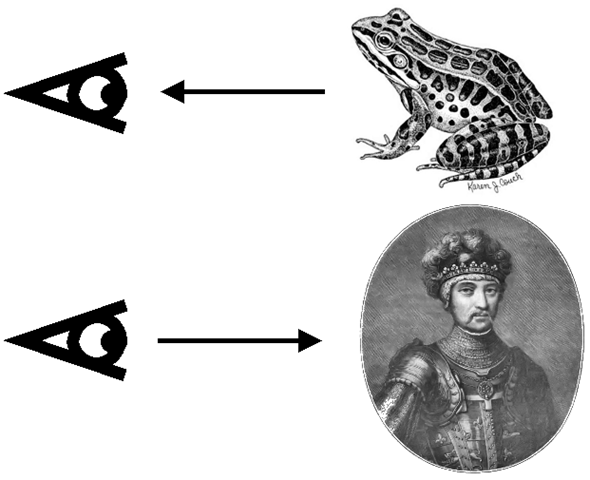Due to laziness, lack of stick-to-it-ive-ness, and a shifting labour market, a modern human no longer keeps a job for life. In the olden days, a human would spend its entire working life doing one thing, such as feeding horses, shoeing horses, riding horses or rendering horses. But in the modern, fast-paced, futuristic world of today, this is no longer possible. For various long-winded reasons, longer-term jobs no longer exist, at least not for long. Some of these reasons are,
robots have taken the work of humans,
immigrants have taken the work of humans, and
some jobs have been made redundant, e.g. horse renderer.
An out-of-work human is at risk of learning that there is more to life than work, so it is necessary to keep its head in the game even when it is not needed in the game. A human’s career fills these jobless gaps. Even without an actual job, the temporarily unemployed human is able to define its self in terms of its career, which consists of jobs it has done and jobs it could, should or would do given the chance. This prevents the human from contemplating doing something else, such as travelling, spending time with loved ones, or following a creative pursuit. All of which have proven to be no benefit to anyone.
The smallest variety of non-mythological human is the child. While physically similar to a very short, well-moisturised adult human, a child is easily distinguished by its,
poor fashion sense,
simplistic world view, and
inadequate shame.

A child spends its days relying on adult humans to clothe it, educate it and shame it. This continues until the child is a self-sufficient adult or thirty-eight, whichever comes first.
Famous children include,
Judy Garland,
the 14th reincarnation of His Holiness the Dalai Lama, and
the 15th reincarnation of His Holiness the Dalai Lama, aka Macaulay Culkin.
Children are renowned for their imagination. Given only paper, crayons and a direct order to “use your imagination,” every child will eventually draw a picture of its house and/or family.

Not only blessed with more imagination than a three-headed JRR Tolkien, a human child is also imbued with an abundance of innocence. Children have not had the chance to do the wrong thing, so are innocent. Exactly which crime a child hasn’t committed is never specified in this pre-emptive defensive strike. This unnecessary insistence of innocence by the defense counsel, typically adult humans, points not to the child’s innocence but the adult’s guilt-ridden state of mind.
This adult guilt is not due to an actual crime. It is the result of the human ability to understand and feel guilt as an idea that is completely disconnected from any real-world act. Crime-free guilt, along with credit card debt and pretending to enjoy wine, are the hallmarks of a human that has transformed from the common house caterpillar of childhood into the common house moth of adulthood.
Only a few centuries ago, the human world was a more harsh
and dangerous place. It was acceptable to treat a human like an
animal, kill a human for committing a minor crime, or ostracise
a human for marrying out of wedlock. But as Bob Dylan almost
said, the times they are a-changed. Humans these days behave
better. It is normal to see a refined human with good table
manners sipping a soy latte with friends while composting
teabags and pointing out that the word ‘actress’ is the last
remaining pillar in the crumbling Church of Misogyny.1 This is because humans are
no longer uncivilised, which by process of elimination makes
them civilised. A civilised human respects the rule of law,
treats others as it would like to be treated, and always puts
its phone on silent at funerals. The rules and regulations that
make humans civilised have developed over the past two millennia
as particularly civilised civilisations have rised
risen and fallen falled. The most important
civilisations, as far as members of the descendants of those
civilisations are concerned, are the ancient Greeks and the
Romans, also ancient.
“The times they are a-changed.” - Almost Bob Dylan
Much like their modern counterpart, the Greeks, the ancient Greeks lived in what is now known, as it was then known, as Greece.2 The ancient Greek civilisation spanned from approximately 700 BC to AD 600. It is credited with inventing and advancing technology, philosophy, politics and mathematics. The ancient Greek civilisation is still considered the best civilisation. Thus, it was used as the foundation for modern Western civilisation.
Incompetent historians are uncertain as to whether the Romans came from Rome or Romania. As such, a compromise has been agreed that they originated halfway between the two, approximately at Sarajevo. Regardless of their uncertain origin, the Romans quickly relocated to Rome and began their Zeus-given mission to conquer the uncivilised world for the purpose of civilising it, and conquer the civilised world for the purpose of conquering it. In this single-pronged two-pronged strategy, they were successful. At its peak, the Roman world covered most of Europe and Northern Africa. At its smallest, the fading empire covered only Rome itself and possibly Sarajevo.
The Romans’ most civilising influence was their military. Regarded as the greatest military force that ever forced, their battle cry was, “A civilised life or an uncivilised death. It’s ostensibly your choice!” Once the conquered locals were subdued, Roman soldiers would civilise them by,
overseeing the construction of infrastructure by slaves,
imposing the rule of law on slaves, and
giving lessons in table manners to those who would be served by slaves.
The hard work of the Romans, particularly that of their slaves, paid off. The world was civilised and remains so thanks to new proponents of civilised slavery. With the Greeks becoming terminally ancient and the Romans moving back to Sarajevo, the task of civility has been taken up by the abstract collective Western civilisation. This merry band of rogues includes,
the United Kingdom (still united at the time of writing),
the United States of America (still united at the time of writing), and
the United Nations (still uniting at the time of writing).

By day, these mild-mannered world powers act in their own self-interest, but by night, with their powers combined, they transform into the greatest civilising force the world has ever known, The West. Their stated mission is,
to seek out evil and stand shoulder-to-shoulder against it with a broad-base coalition of like-minded nations,
to liberate markets from the clutches of those who would clutch them, and
FREEDOM!!!
Che Guevara was a Marxist revolutionary and benevolent murderer. In 1959, with Fidel Castro, he fought for and won Cuba’s freedom from the clutches of capitalism by toppling the Cuban dictator and Bond villain, Batista. The revolution took place two years after Che, Fidel and their band of brothers landed a leaky boat on Cuba. They fought and recruited their way to Havana, only to find that Batista had retreated to his orbiting space station.

Undeterred by Batista’s last-second escape, the dynamic duo took control of Cuba with the promise of democracy. Luckily, the promise was enough. Fidel and Che never needed to actually deliver. They were able to carry on the oppression that the people were already so fond of.
Che set about bringing justice to Cuba by executing those combatants convicted of war crimes committed during the revolution. To make sure the Cuban people got all the justice they’d ever want, Che also ordered the executions of an unknown number of innocents.

Once their new government was established, Che and Fidel set about remaking Cuba. The Americans suggested that wealth and equality could be created through capitalism, but Fidel had some new and fresh ideas. He created equality without bothering with the wealth and succeeded in making all Cubans equally poor.

The Americans took umbrage at this turn of events and invaded Cuba at the Bay of Pigs to remove Fidel and Che. This failed invasion only served to convince the Cubans even more that democracy and freedom weren’t for them. Fidel, Che and communism tightened their grip on Cuba.
After his success in Cuba, Che expanded his effort to replace oppression with a slightly different kind of oppression by creating communist revolutions around the world. The world replied “Nyet, comrade!” as Che led failed attempts to revolutionise the Congo and Bolivia. While on the run in Bolivia, he was captured and executed, possibly by Batista’s orbiting space laser.
When it comes to communist revolutions, one win from three attempts ain’t bad. Success in Cuba and his idealism were enough to cement Che as an idol of defiance, especially among future generations of youth. Che fought for what he believed in and, apart from the occasional superfluous execution, did so honourably. He will be idolised for many years to come by young people who are willing to forgive his war crimes.

Humans know it is safe to repeat what has been done before. For example, if a human eats a plant then it knows it is safe to eat it again. These boring habits keep humans alive and ensure the sitcom Friends is repeated forever. A human that does the same thing every day is existing in its comfort zone, which is a state-of-mind where the human is not challenged by change. Many humans know that just existing is boring, so are compelled to leave their comfort zone and be challenged.

Because the comfort zone consists of boring places the human has already been, boring activities the human has already done, and boring, delicious plants the human has already eaten, the quickest way to escape these familiarities is to travel. Travelling broadens the bored mind with new, delicious challenges every day.
Where will I go if I can’t go to my usual, boring place?
Where can I see my usual, boring episode of Friends?
What will I eat if I cannot get my delicious, boring plant?
A human benefits from travel and leaving their comfort zone because they enter the discomfort zone, which is filled with new, boring places, new, boring activities and new, delicious, boring plants. These challenge the human to expand what they think is normal and boring and the human’s comfort zone grows to include new things, such as a new, delicious plant and old, boring episodes of Friends with subtitles in a new, delicious language.

In the early part of the twentieth century, human productivity was limited by crude electronic devices, such as the fax machine and the Screaming InterruptorTM. Time passed, and soon their productivity became limited by advanced technologies, such as Facebook and computerised Solitaire. The 21st century promises even more technological breakthroughs, and humans hope to finally realise their dream of not getting anything done at all.

Before computers did everything, from sending spam emails to filtering spam emails, humans understood how things worked. A human could take control of its own life: repair its own car, build its own house and sleep with its own spouse. Automation of these mundane tasks left humans free to do what really matters, the details of which are yet to be confirmed. Luckily, computers also provide an effective distraction from the redundant nature of modern life until this great and worthy To Do list is created.
All computer technology is based on the dark art of boolean logic. Like a racist, computers only understand two polar states. In computer language, these are 0 and 1, which are also known as “true and false” or “us and them.” Individual 0s and 1s are called binary digits or bits for short. Combinations of bits can be written to represent any piece of information from simple numbers to the meaning of life.
0 = 0
1 = 1
10 = 2
11 = 3
01010100011010000110
01010010000001101101
01100101011000010110
11100110100101101110 = The meaning of life
Improving computers means increasing the rate at which they process information encoded as 0s and 1s. In the eighties, mobile phones computed 1200 bits per second, so could only process simple conversations. In 2010, they were capable of processing 100 000 000 bits per second, so could read at a fifth grade level. By 2050, it is expected that bit rates will be so high that mobile phones will arbitrate complex custody battles and provide accurate psychic readings.
With the expansion of computers into the fields of relationship counselling and fortune telling, a new foundation is needed that isn’t restricted to the bigoted black and white world of yes and no. Quantum computers offer the much needed third state of maybe. Instead of only providing definite states of yes and no, a quantum computer is able to be ambiguous.
A quantum computer uses the indeterminate state of maybe and astral projection to calculate all solutions simultaneously. Quantum bits have a unique chakra, so occupy another dimension. This means they can be in two places at once, and their aura can be channeled to calculate the cube roots of large prime numbers. A simple analogy, which will clear up any confusion regarding this straightforward idea, is a flipped coin that can land on both heads and tails at the same time.3

Humans love being better than each other. In combination with an effective alarm clock, the prospect of competitive triumph is what gets them out of bed in the morning.
Competition arises naturally in the animal kingdom because all organisms chase the same scarce resources. Male lions fight for the right to mate with females, chihuahuas tussle for prime handbag position, and geese gorge themselves to become the tastiest foie gras. These battles for supremacy are won in competitions of speed, strength and gluttony. To the victors go the spoils of more offspring, more behind-the-ear scratches and more Michelin stars.

Humans no longer compete for survival because all their basic needs are easily provided for by technology and mass production. But this doesn’t mean they have stopped trying. They continually create artificial competitions to keep everyone on their toes. The most common of these competitive pursuits are sports like baseball, sprinting and war.
Many humans are not overtly competitive, so do not wish to achieve the fastest time or highest kill count. For these cowards, more subtle competitions have been created.
Money getting The goal is to get more money than everyone else. The game ends when one human gets all the money.
Handsomeness Contestants have until the age of 28 to improve their looks by any means. The winners are announced each month in Vogue and GQ magazines. Extra points are awarded for well-defined abs, pert breasts and symmetrical features.
Consumption The Internet and ubiquitous mobile devices have turned the consumption of information into an achievement. The winner is the human who consumes the most content, as measured by their regurgitation of that content onto Twitter, Facebook and other social media.
Fame This game is simple. The winner is the human who can no longer walk down the street for fear of being mobbed by fans. Each stalker is worth ten regular fans. In the event of a tie, the winner is determined by a count back of Twitter followers.
Sex This competition is segregated by gender. The male winner is the man who beds the most women without devoting himself to any of them. For women, the winner is the woman who garners the greatest reputation for being a firecracker in the sack without actually sleeping with anyone.
Growth This is a team event. Team humanity must create as much economic wealth as possible. Points are deducted for each recession. A winner is never declared. The game ends when capitalism fails.
Continuity is the human ability to recognise something as the same thing over time. Consider an axe, which consists of a handle and a blade. If the blade is replaced, and then the handle is replaced, a human will tell you it is still the same axe. Another example is the Frog Prince. A prince is transformed into a frog then back into a prince by the kiss of a princess who wants to marry him. The princess, and any human, will tell you that the prince was always there, even when he was a frog, which has none of the physical properties of a prince. This is because the continuity of a thing is inside the human mind, independent of the thing in the real world.
Being able to create continuities is the foundation for planning, memory and forming relationships. A human can plan because it can form the idea that what exists today will continue to exist tomorrow. It knows where to hunt for food this year because its mind created the memory of where it was good to hunt last year. And a relationship, such as marriage, depends on recognising another human as the same person from one day to the next, even when that person is temporarily a frog.
The ability to create continuities in its mind is so basic that the human doesn’t notice it. Except on rare, shameful occasions, a human does not need to logically deduce who is in its marital bed. Its mind subconsciously imposes the continuity of its spouse and/or prince without needing to gather any evidence.
Continuity can be brought to the surface when considering the difference between looking and seeing. Looking is bringing something into the field of vision. Seeing is imposing a continuity on that thing. When a human bumps into another human that it doesn’t expect to see, e.g. seeing a spouse while at work, it will look at them without seeing who they are. Only after the mind has revived the correct, dormant continuity does the human stop looking at the unknown person and begin to see its prince.
Combination of the words ‘look’ and ‘see’. To have something in your field of vision and apply a continuity to it.
Physics textbooks often depict sight with the picture of an eye with arrows pointing towards the eye, which is a simple depiction of the light from objects entering the eye from without. This is to counter the common misinterpretation of sight, being that it originates from the eyes and moves towards the objects being looked at. In physics, light moving from an object to the eye is an accurate description of sight, but the interpretation of sight as starting at the eyes and projecting outward is an accurate description of seeing.
A continuity originates in the mind and not in the physical world, so it can only be seen by projecting it outward onto the world. A human only sees another human as its spouse because it projects a continuity onto it. Hence, a human looks at the physical world but sees its mind’s creations. A human looks at another human but sees someone it loves because it has projected its mind’s loving creation outwards.

A continuity is independent of the physical thing that stimulated its creation, so it can survive the original thing, mutate and become disconnected. For example, the continuity of the prince survives in the mind of the princess, who established his continuity when she knew him directly. Hence, the princess will say her prince “is still with me” even when he is a frog or long dead.
Continuities serve humans well because they are the basis of useful abilities, such as planning. But, like fire, which is also a good servant, a continuity is a terrible master. When continuities take control, the human cannot see the physical world at all. It only sees its mind’s creations and lives entirely in this imagined world.
When imagining its world, a human, with its bias towards living and succeeding, will attempt to make the tail wag the dog in its favour. Instead of looking at the world and then creating useful continuities, the slavish human creates continuities first, then finds places to put them even if they aren’t useful. This is why the princess is prepared to marry a frog. She created the continuity of a prince long before she met her prince and didn’t let a little bit of shape-shifting destroy her imagined reality.
The ultimate form of continuity is permanence. A thing that continues forever is permanent. Humanity’s attempts at eternity include statues, memorials and leagcies. Beguiled by eternal continuity, the ultimate human goal is to live forever. In lieu of immortality, a human makes do with being remembered forever and secures its permanent continuity in the minds of other humans while it can.

It is more apt to say that the feminine forms of particular job titles, such as ‘comedienne’ and ‘waitress’, are not foundational pillars of inequality. Rather, they are only ornamentation in the Church of Misogyny. Perhaps a well-executed piece of gilding or a pleasing font.↩︎
Please send all Pulitzer Prizes to Cameron “deserved winner” Davis, 1 Highbrow Lane, Oxbridge.↩︎
For further explanation of the operation of quantum computers, please consult your chosen god.↩︎